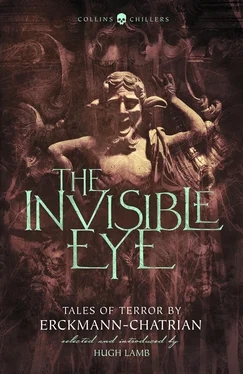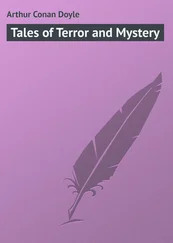‘It was certainly an extraordinary affair! The burgomaster declared it was the work of the devil. The chamber was examined; they replastered its walls. A notice of the death was sent to Neustadt, on the margin of which the clerk wrote – “Died suddenly of apoplexy”.
‘All Nuremberg was indignant against the landlord of the Boeuf-gras, and wished to compel him to take down the iron stanchion of his signboard, on the pretext that it put dangerous ideas in people’s heads. But you may easily imagine that old Nikel Schmidt didn’t listen with the ear on that side of his head.
‘“That stanchion was put there by my grandfather,” he said; “the sign of the Boeuf-gras has hung on it from father to son, for a hundred and fifty years; it does nobody any harm, it’s more than thirty feet up; those who don’t like it have only to look another way.”
‘People’s excitement gradually cooled down, and for several months nothing happened. Unfortunately, a student from Heidelberg, on his way to the University, came to the Boeuf-gras and asked for a bed. He was the son of a pastor.
‘Who would suppose that the son of a pastor would take into his head the idea of hanging himself to the stanchion of a public-house sign, because a furrier and a soldier had hung themselves there before him? It must be confessed, Master Christian, that the thing was not very probable – it would not have appeared more likely to you than it did to me. Well—’
‘Enough! Enough!’ I cried; ‘it is a horrible affair. I feel sure there is some frightful mystery at the bottom of it. It is neither the stanchion nor the chamber—’
‘You don’t mean that you suspect the landlord? – as honest a man as there is in the world, and belonging to one of the oldest families in Nuremberg?’
‘No, no! Heaven keep me from forming unjust suspicions of anyone; but there are abysses into the depths of which one dares not look.’
‘You are right,’ said Toubec, astonished at my excited manner; ‘and we had much better talk of something else. By-the-way, Master Christian, what about our landscape, the view of Sainte-Odile?’
The question brought me back to actualities. I showed the broker the picture I had just finished. The business was soon settled between us, and Toubec, thoroughly satisfied, went down the ladder, advising me to think no more of the student of Heidelberg.
I would very willingly have followed the old broker’s advice, but when the devil mixes himself up with our affairs he is not easily shaken off.
II
In solitude, all these events came back to my mind with frightful distinctness.
The old woman, I said to myself, is the cause of all this; she alone has planned these crimes, she alone has carried them into execution; but by what means? Has she had recourse to cunning only or really to the intervention of the invisible powers?
I paced my garret, a voice within me crying, ‘It is not without purpose that Heaven has permitted you to see Fledermausse watching the agony of her victim; it was not without design that the poor young man’s soul came to wake you in the form of a night-moth! No! all this has not been without purpose. Christian, Heaven imposes on you a terrible mission; if you fail to accomplish it, fear that you yourself may fall into the toils of the old woman! Perhaps at this moment she is laying her snares for you in the darkness!’
During several days these frightful images pursued me without cessation. I could not sleep; I found it impossible to work; the brush fell from my hand, and shocking to confess, I detected myself at times complacently contemplating the dreadful stanchion. At last, one evening, unable any longer to bear this state of mind, I flew down the ladder four steps at a time, and went and hid myself beside Fledermausse’s door, for the purpose of discovering her fatal secret.
From that time there was never a day that I was not on the watch, following the old woman like her shadow, never losing sight of her; but she was so cunning, she had so keen a scent that without even turning her head she discovered that I was behind her, and knew that I was on her track. But nevertheless, she pretended not to see me – went to the market, to the butcher’s, like a simple housewife; only she quickened her pace and muttered to herself as she went.
At the end of a month I saw that it would be impossible for me to achieve my purpose by these means, and this conviction filled me with an inexpressible sadness.
‘What can I do?’ I asked myself. ‘The old woman has discovered my intentions, and is thoroughly on her guard. I am helpless. The old wretch already thinks she sees me at the end of the cord!’
At length, from repeating to myself again and again the question, ‘What can I do?’ a luminous idea presented itself to my mind.
My chamber overlooked the house of Fledermausse, but it had no dormer window on that side. I carefully raised one of the slates of my roof, and the delight I felt on discovering that by this means I could command a view of the entire antique building can hardly be imagined.
‘At last I’ve got you!’ I cried to myself; ‘you cannot escape me now! From here I shall see everything. You will not suspect this invisible eye – this eye that will surprise the crime at the moment of its inception! Oh, Justice! It moves slowly, but it comes!’
Nothing more sinister than this den could be imagined – a large yard, paved with moss-grown flagstones; a well in one corner, the stagnant water of which was frightful to behold; a wooden staircase leading up to a railed gallery, to the left, on the first floor, a drain-stone indicated the kitchen; to the right, the upper windows of the house looked into the street. All was dark, decaying, and dank-looking.
The sun penetrated only for an hour or two during the day the depths of this dismal sty; then the shadows again spread over it – the light fell in lozenge shapes upon the crumbling walls, on the mouldy balcony, on the dull windows.
Oh, the whole place was worthy of its mistress!
I had hardly made these reflections when the old woman entered the yard on her return from market. First, I heard her heavy door grate on its hinges, then Fledermausse, with her basket, appeared. She seemed fatigued – out of breath. The border of her cap hung down upon her nose, as, clutching the wooden rail with one hand, she mounted the stairs.
The heat was suffocating. It was exactly one of those days when insects of every kind – crickets, spiders, mosquitoes – fill old buildings with their grating noises and subterranean borings.
Fledermausse crossed the gallery slowly, like a ferret that feels itself at home. For more than a quarter of an hour she remained in the kitchen, then came out and swept the stones a little, on which a few straws had been scattered; at last she raised her head, and with her green eyes carefully scrutinised every portion of the roof from which I was observing her.
By what strange intuition did she suspect anything? I know not; but I gently lowered the uplifted slate into its place, and gave over watching for the rest of that day.
The day following Fledermausse appeared to be reassured. A jagged ray of light fell into the gallery; passing this, she caught a fly, and delicately presented it to a spider established in an angle of the roof.
The spider was so large, that, in spite of the distance, I saw it descend then, gliding along one thread, like a drop of venom, seize its prey from the fingers of the dreadful old woman, and remount rapidly. Fledermausse watched it attentively; then her eyes half-closed, she sneezed, and cried to herself in a jocular tone: ‘Bless you, beauty! – bless you!’
For six weeks I could discover nothing as to the power of Fledermausse: sometimes I saw her peeling potatoes, sometimes spreading her linen on the balustrade. Sometimes I saw her spin; but she never sang, as old women usually do, their quivering voices going so well with the humming of the spinning-wheel. Silence reigned about her. She had no cat – the favourite company of old maids; not a sparrow ever flew down to her yard, in passing over which the pigeons seemed to hurry their flight. It seemed as if everything were afraid of her look.
Читать дальше












